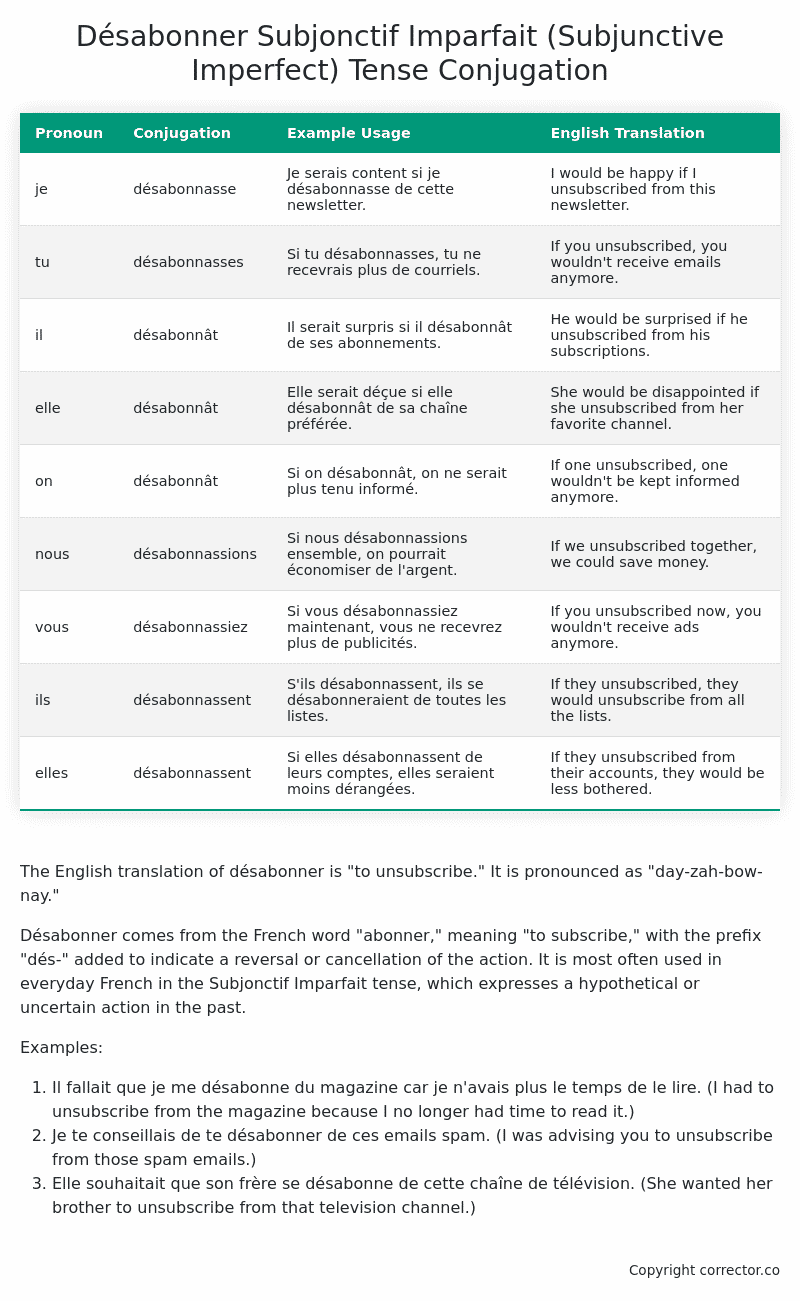Subjonctif Imparfait (Subjunctive Imperfect) Tense Conjugation of the French Verb désabonner
Introduction to the verb désabonner
The English translation of désabonner is “to unsubscribe.” It is pronounced as “day-zah-bow-nay.”
Désabonner comes from the French word “abonner,” meaning “to subscribe,” with the prefix “dés-” added to indicate a reversal or cancellation of the action. It is most often used in everyday French in the Subjonctif Imparfait tense, which expresses a hypothetical or uncertain action in the past.
Examples:
- Il fallait que je me désabonne du magazine car je n’avais plus le temps de le lire. (I had to unsubscribe from the magazine because I no longer had time to read it.)
- Je te conseillais de te désabonner de ces emails spam. (I was advising you to unsubscribe from those spam emails.)
- Elle souhaitait que son frère se désabonne de cette chaîne de télévision. (She wanted her brother to unsubscribe from that television channel.)
Table of the Subjonctif Imparfait (Subjunctive Imperfect) Tense Conjugation of désabonner
| Pronoun | Conjugation | Example Usage | English Translation |
|---|---|---|---|
| je | désabonnasse | Je serais content si je désabonnasse de cette newsletter. | I would be happy if I unsubscribed from this newsletter. |
| tu | désabonnasses | Si tu désabonnasses, tu ne recevrais plus de courriels. | If you unsubscribed, you wouldn’t receive emails anymore. |
| il | désabonnât | Il serait surpris si il désabonnât de ses abonnements. | He would be surprised if he unsubscribed from his subscriptions. |
| elle | désabonnât | Elle serait déçue si elle désabonnât de sa chaîne préférée. | She would be disappointed if she unsubscribed from her favorite channel. |
| on | désabonnât | Si on désabonnât, on ne serait plus tenu informé. | If one unsubscribed, one wouldn’t be kept informed anymore. |
| nous | désabonnassions | Si nous désabonnassions ensemble, on pourrait économiser de l’argent. | If we unsubscribed together, we could save money. |
| vous | désabonnassiez | Si vous désabonnassiez maintenant, vous ne recevrez plus de publicités. | If you unsubscribed now, you wouldn’t receive ads anymore. |
| ils | désabonnassent | S’ils désabonnassent, ils se désabonneraient de toutes les listes. | If they unsubscribed, they would unsubscribe from all the lists. |
| elles | désabonnassent | Si elles désabonnassent de leurs comptes, elles seraient moins dérangées. | If they unsubscribed from their accounts, they would be less bothered. |
Other Conjugations for Désabonner.
Le Present (Present Tense) Conjugation of the French Verb désabonner
Imparfait (Imperfect) Tense Conjugation of the French Verb désabonner
Passé Simple (Simple Past) Tense Conjugation of the French Verb désabonner
Passé Composé (Present Perfect) Tense Conjugation of the French Verb désabonner
Futur Simple (Simple Future) Tense Conjugation of the French Verb désabonner
Futur Proche (Near Future) Tense Conjugation of the French Verb désabonner
Plus-que-parfait (Pluperfect) Tense Conjugation of the French Verb désabonner
Passé Antérieur (Past Anterior) Tense Conjugation of the French Verb désabonner
Futur Antérieur (Future Anterior) Tense Conjugation of the French Verb désabonner
Subjonctif Présent (Subjunctive Present) Tense Conjugation of the French Verb désabonner
Subjonctif Passé (Subjunctive Past) Tense Conjugation of the French Verb désabonner
Subjonctif Imparfait (Subjunctive Imperfect) Tense Conjugation of the French Verb désabonner (this article)
Subjonctif Plus-que-parfait (Subjunctive Pluperfect) Tense Conjugation of the French Verb désabonner
Conditionnel Présent (Conditional Present) Tense Conjugation of the French Verb désabonner
Conditionnel Passé (Conditional Past) Tense Conjugation of the French Verb désabonner
L’impératif Présent (Imperative Present) Tense Conjugation of the French Verb désabonner
L’infinitif Présent (Infinitive Present) Tense Conjugation of the French Verb désabonner
Struggling with French verbs or the language in general? Why not use our free French Grammar Checker – no registration required!
Get a FREE Download Study Sheet of this Conjugation 🔥
Simply right click the image below, click “save image” and get your free reference for the désabonner Subjonctif Imparfait tense conjugation!

Désabonner – About the French Subjonctif Imparfait (Subjunctive Imperfect) Tense
Formation
Common Everyday Usage Patterns
Interactions with Other Tenses
Subjonctif Présent
Indicatif Passé Composé
Conditional
Conditional Perfect
Summary
I hope you enjoyed this article on the verb désabonner. Still in a learning mood? Check out another TOTALLY random French verb conjugation!


